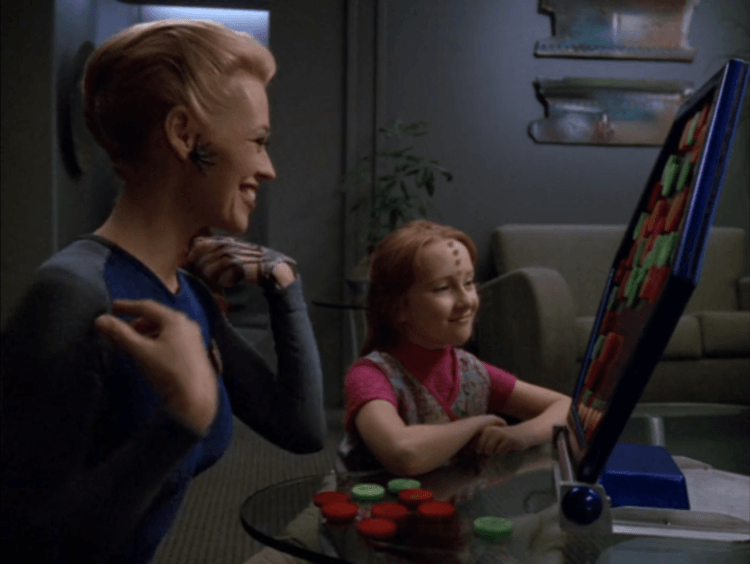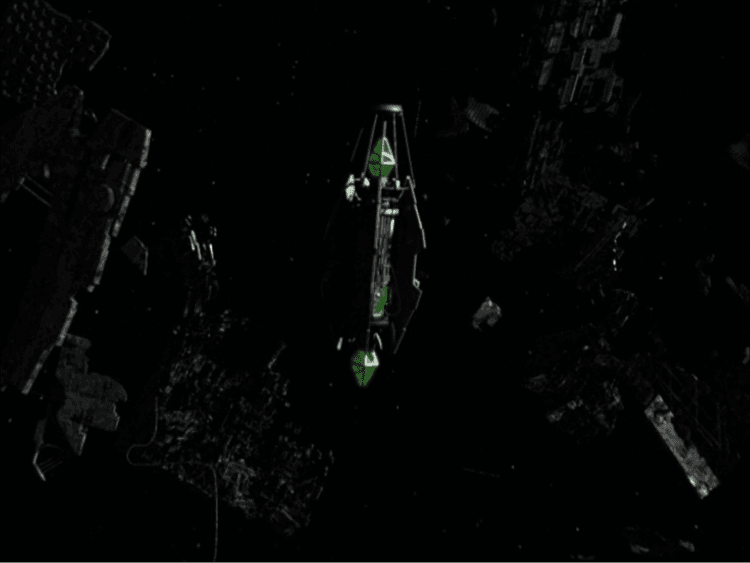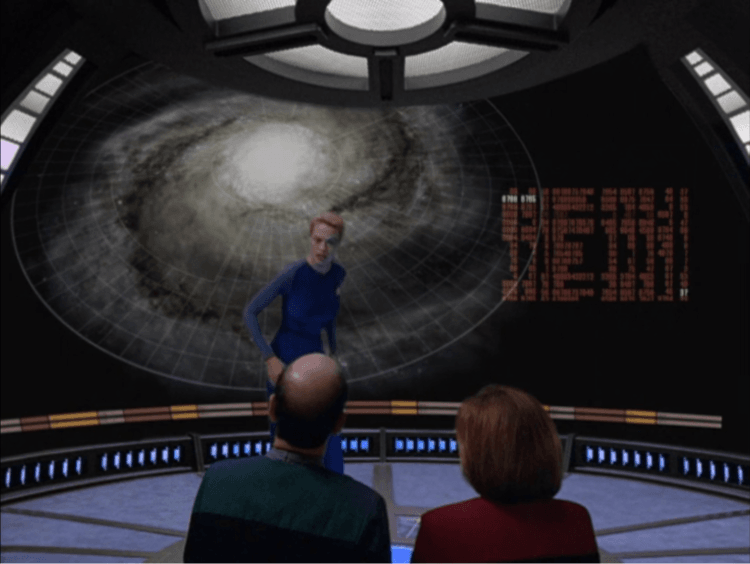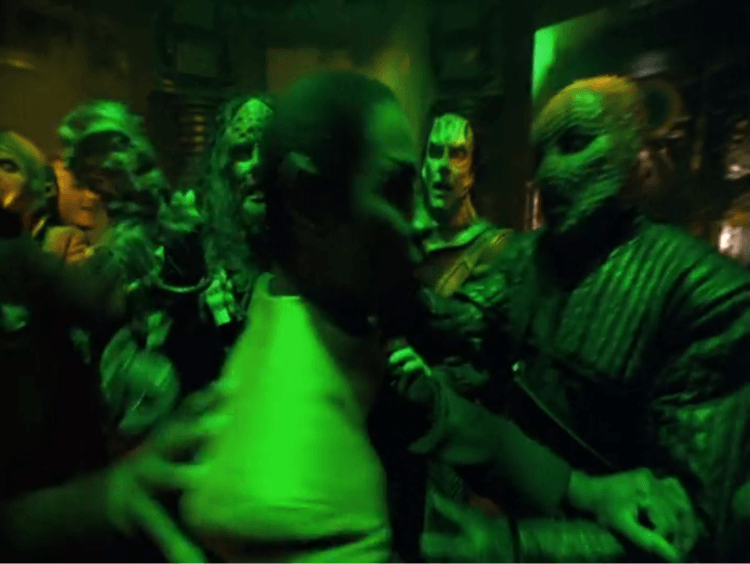
Welcome to ‘Final Frontier Friday’ everyone! After a brief hiatus, we’re back with more of the content you crave – if what you is crave rambling, long-winded reflections on old ‘Star Trek’ episodes. You might say it’s fortuitous that our glorious return coincides (sort of) with that of Seven of Nine, who during our break made her ‘Star Trek: Picard‘ debut in the episode, ‘Stardust City Rag’, which we’ll be covering… some other time (that joke might’ve actually worked if I didn’t insist on naming the episode in the article title). We are doing a Seven episode though, it’s just one from her ‘Voyager’ days. So settle in and join us for a look back at ‘Infinite Regress’, in which an errant piece of Borg technology causes Seven to manifest the personalities of individuals assimilated by the Collective.
 ‘Infinite Regress’ is an episode that started life as two unrelated pitches. One of these – which was ultimately rejected as it was deemed implausible – has been described by producer Kenneth Biller one in which Voyager would have encountered someone who would try to extract (for want of a better word) the personality of an assimilated loved one from Seven of Nine’s mind. This was ultimately rejected on the grounds that it seemed, according to Biller, “a little far-fetched”. The other pitch was originated with regular contributor Jimmy Diggs and introduced the concept of the vinculum – the Borg component that maintains connections between and suppressed the individuality of drones, the malfunction of which was central to the finished episode. Though Diggs’ pitch was likewise rejected, the concept of the vinculum itself appealed to then-showrunner Brannon Braga.
‘Infinite Regress’ is an episode that started life as two unrelated pitches. One of these – which was ultimately rejected as it was deemed implausible – has been described by producer Kenneth Biller one in which Voyager would have encountered someone who would try to extract (for want of a better word) the personality of an assimilated loved one from Seven of Nine’s mind. This was ultimately rejected on the grounds that it seemed, according to Biller, “a little far-fetched”. The other pitch was originated with regular contributor Jimmy Diggs and introduced the concept of the vinculum – the Borg component that maintains connections between and suppressed the individuality of drones, the malfunction of which was central to the finished episode. Though Diggs’ pitch was likewise rejected, the concept of the vinculum itself appealed to then-showrunner Brannon Braga.
Elements of the two ideas were ultimately combined by staff writer Robert Doherty, with Biller suggesting that “something weird” should happen to Seven of Nine. Though the lion’s share of the script was completed by Doherty, Braga soon found himself contributing a considerable amount of uncredited rewriting. This was less a reflection on Doherty than of his own fascination with the vinculum and the need to make sure that side of the story actually made sense.
 If all that makes it sound like the episode was complicated to write, just think of what it was like to act in! In fact, it provided a particular challenge for Jeri Ryan. Part of this was due to the demands of essentially playing a dozen characters that she often had to switch between several times in a single scene. This would be difficult for any actor, especially given the amount of prep time (or rather, the lack thereof) that one is typically afforded on a weekly series churning out twenty-plus episodes per season. But some of it also had to do with her lack of prior familiarity with ‘Star Trek’. This issue arose because among the personas Seven assumes over the course of an episode are a Ferengi and a Klingon, and Ryan at the time had virtually no familiarity with either species.
If all that makes it sound like the episode was complicated to write, just think of what it was like to act in! In fact, it provided a particular challenge for Jeri Ryan. Part of this was due to the demands of essentially playing a dozen characters that she often had to switch between several times in a single scene. This would be difficult for any actor, especially given the amount of prep time (or rather, the lack thereof) that one is typically afforded on a weekly series churning out twenty-plus episodes per season. But some of it also had to do with her lack of prior familiarity with ‘Star Trek’. This issue arose because among the personas Seven assumes over the course of an episode are a Ferengi and a Klingon, and Ryan at the time had virtually no familiarity with either species.
Ryan herself is actually the reason I wanted to feature ‘Infinite Regress’ in the first place. Frankly, I’ve always felt that she tends to get less credit than she deserves as an actor, particularly where ‘Voyager’ is concerned. Much of that, I think, is owed to the not-incorrect impression that Seven of Nine was introduced in part to add some sex appeal to the show. Combine that with the character’s typically flat affect and it’s easy to see how some people might not fully appreciate her performance. But episodes like ‘Infinite Regress’ put the lie to any insinuation that Ryan couldn’t go toe-to-toe with any of her unquestionably capable castmates.
 In fact, in watching ‘Infinite Regress’ it’s hard not to be struck by Jeri Ryan’s performance, which easily stands among the best work she did during her time on ‘Voyager’. Sure, she can be a bit broad at times, but when you’re playing so many different characters, it has to be clear when you’re switching between them, and at times like that, a broad performance is the order of the day. And it’s a performance that’s all the more impressive given the lack of prep time and the fact that she had to review tapes of old episodes in order to get a feel for some of the myriad personalities she had to embody.
In fact, in watching ‘Infinite Regress’ it’s hard not to be struck by Jeri Ryan’s performance, which easily stands among the best work she did during her time on ‘Voyager’. Sure, she can be a bit broad at times, but when you’re playing so many different characters, it has to be clear when you’re switching between them, and at times like that, a broad performance is the order of the day. And it’s a performance that’s all the more impressive given the lack of prep time and the fact that she had to review tapes of old episodes in order to get a feel for some of the myriad personalities she had to embody.
Of course, it’s not just that she spends the hour ping-ponging between a dozen or so different, entirely unrelated characters at a moment’s notice. It’s that so many of them present a near total contrast to Seven’s usually reserved nature. Hell, it doesn’t get much more opposite to Seven’s usual demeanor than the larger than life boisterousness of a Klingon Warrior, and Ryan captures the contrast quite well. Likewise, the complete shift in her physicality when she switches to the Ferengi personality. I keep coming back to those two because they present the biggest difference from Seven of Nine, but there are plenty of personalities call for Ryan to clearly play another character without the freedom to go over the top that Klingons offer. The best examples of this are probably the little girl who runs off with Naomi or the Starfleet officer who was assimilated on the Tombaugh. Altogether, it adds up to a tour de force performance and an excellent example of Ryan’s often underappreciated range.
 Beyond singing Jeri Ryan’s praises, there is one subject I feel I need to address before putting this episode to bed. When I’ve covered Borg stories in the past, I’ve alluded to the villain decay that came to affect them over the years, particularly during the ‘Voyager’ years. I usually talk about this in terms of our heroes stopping the unstoppable monolith yet again, but in a broader sense, there’s also an aspect of what you might describe as “familiarity breeding contempt” to that villain decay. Think of it as the difference between “Oh no! The Borg!” and “Oh, the Borg. Must be Tuesday”. Or to put it another way, the Borg only appeared in six episodes across the entire seven-season run of ‘The Next Generation’ (and the number can get as low as four depending on how you want to count two-parters like ‘The Best of Both Worlds‘ and ‘Descent’). By contrast, they appeared in some twenty shows across the last four seasons of ‘Voyager’, a number that only gets higher if you start factoring in episodes that center on Seven of Nine without featuring the Borg per se. Though only a relative handful of those episodes featured the Borg as primary antagonists (think ‘Dark Frontier’ or ‘Unimatrix Zero’), the very nature of a show like ‘Human Error’ or, indeed, ‘Infinite Regress’ is such that you are going to learn something about the Borg, even if their actual presence is limited to flashbacks, cameos, or Seven of Nine. Over time, that adds up, with the end result being to demystify and render mundane what was once a terrifying unknown.
Beyond singing Jeri Ryan’s praises, there is one subject I feel I need to address before putting this episode to bed. When I’ve covered Borg stories in the past, I’ve alluded to the villain decay that came to affect them over the years, particularly during the ‘Voyager’ years. I usually talk about this in terms of our heroes stopping the unstoppable monolith yet again, but in a broader sense, there’s also an aspect of what you might describe as “familiarity breeding contempt” to that villain decay. Think of it as the difference between “Oh no! The Borg!” and “Oh, the Borg. Must be Tuesday”. Or to put it another way, the Borg only appeared in six episodes across the entire seven-season run of ‘The Next Generation’ (and the number can get as low as four depending on how you want to count two-parters like ‘The Best of Both Worlds‘ and ‘Descent’). By contrast, they appeared in some twenty shows across the last four seasons of ‘Voyager’, a number that only gets higher if you start factoring in episodes that center on Seven of Nine without featuring the Borg per se. Though only a relative handful of those episodes featured the Borg as primary antagonists (think ‘Dark Frontier’ or ‘Unimatrix Zero’), the very nature of a show like ‘Human Error’ or, indeed, ‘Infinite Regress’ is such that you are going to learn something about the Borg, even if their actual presence is limited to flashbacks, cameos, or Seven of Nine. Over time, that adds up, with the end result being to demystify and render mundane what was once a terrifying unknown.
And with that, we bring this installment to a close. What are your thoughts on ‘Infinite Regress’? Let me know in the comments, and be sure to check back in two weeks when we’ll return with another ‘Final Frontier Friday’!
